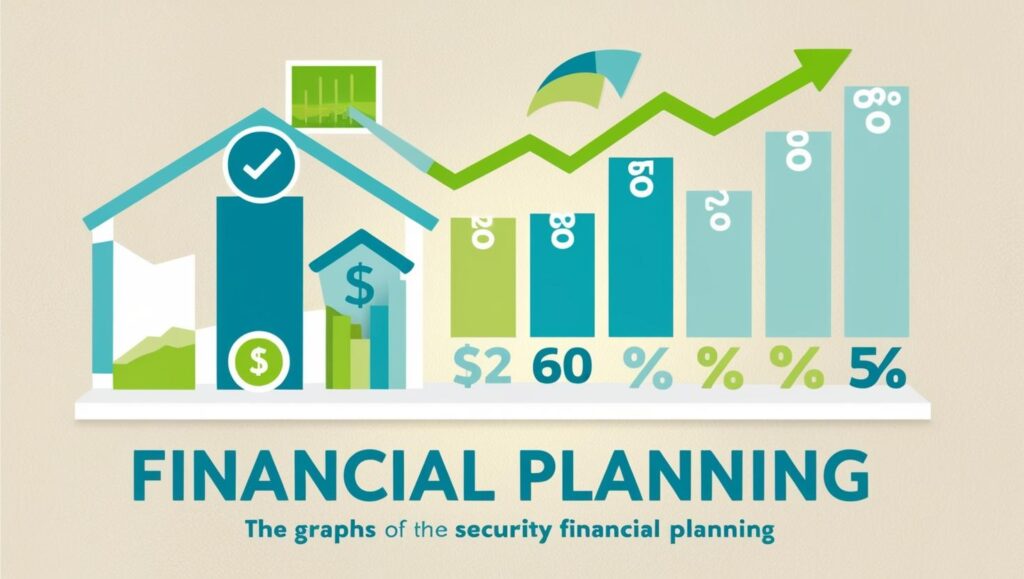What is Financial planning?
Financial planning is the process of setting financial goals and creating a roadmap to achieve them. It involves budgeting, saving, investing, risk management, and tax planning to secure long-term financial stability. A well-structured financial plan helps individuals manage income, reduce financial stress, and prepare for unexpected expenses, ensuring a secure future.

5 Key Benefits of Financial Planning: Financial planning isn’t about saving, it’s about understanding and protecting what you have. We all face financial risks and identifying them is the first step in creating a solid financial plan.
- Types of financial risks individuals face: Job loss, unexpected medical expenses, bad investment decisions, and even natural disasters.
- Importance of risk assessment in planning: Conducting a risk assessment allows you to pinpoint potential threats to your financial stability. So you can prepare for them.
- Strategies to mitigate financial risks: Diversifying your investments, creating an emergency fund, and reviewing your financial situation regularly are practical ways to reduce your risk exposure.
B. Entrepreneurial Success: Key Financial Planning Benefits
When starting a business, having a financial plan can increase your chances of success.
- How much to save and why it matters: A general rule of thumb is to save at least 3-6 months’ living expenses as a safety net.
- Different ways to build an emergency fund: High-yield savings accounts, regular savings, and automatic transfers can help you build this fund without feeling the pinch.
- Maintaining and accessing your fund when needed: Make sure you choose a savings or investment vehicle that has easy access to your emergency fund and still gives you a good return.
C. Insurance Coverage Analysis
5 Key Benefits of Financial Planning: Insurance might not be the most exciting topic but it’s a crucial part of your financial planning.
- Types of insurance to consider in planning: Health, life, disability, property, and liability insurance are must-haves.
- Evaluating existing coverage and gaps: Reviewing your policies regularly can reveal gaps in coverage so you’re covered.
- How to choose the right insurance policy for your needs: Consider your age, dependents, income, and specific financial needs before choosing a policy.
2. Achieve Your Financial Goals Through Planning
A. Defining Financial Goals at Different Life Stages
Financial planning isn’t one size fits all; it evolves as you go through different stages of life.
- Long-term benefit of strategic financial advice: Setting realistic and achievable goals can lead to a stable financial future.* How to categorize and prioritize goals: Categorizing short-term, medium-term, and long-term goals can give you clarity and direction.
- Revising goals as life changes: It’s essential to review and adjust your goals as life changes—like marriage, kid,s or career changes—happen.

**B. Financial Roadmap
5 Key Benefits of Financial Planning: Having a plan is like having a GPS for your finances; it keeps you on track.
- Steps to create an actionable plan: Start by assessing your current financial situation, defining your goals, and creating strategies to achieve them.
- Importance of timelines: Having deadlines creates accountability and helps you stay committed to your goals.
- Tools to track progress: Budgeting apps or spreadsheets can help you monitor your progress and make adjustments as needed.
**C. Accountability and Motivation
Staying the course is often the hardest part of financial planning.
- Role of accountability in financial success: Share your goals with someone else and you’ll be more accountable. Whether it’s a partner or a financial coach, having someone in your corner can motivate you.
- How to find a mentor or financial advisor: Look for someone with experience and someone you trust. Personal referrals can be helpful in this search.
- How to stay motivated: Celebrate small wins, remind yourself of your big goals, and keep a record of your achievements to stay motivated.
3. Long-term benefits: Benefits of Strategic Financial Advice
**A. Financial Planning Fundamentals
A plan involves understanding where your money goes.
- Types of savings accounts and their uses: From traditional savings accounts to certificates of deposit, know which ones are suitable for you.
- Evaluating interest rates and fees: Consider the net interest you’re getting after fees; sometimes the lowest rate isn’t the best deal.
- Role of automatic savings in building wealth: Automating your savings can help you save consistently without thinking about it.
B. Financial Success: Key Planning Benefits for Millennials
As a millennial, you gotta navigate financial decisions for a secure future.
- Investment vehicle overview (stocks, bonds, etc.): you can make informed asset allocation decisions.
- Risk tolerance and time horizon: you know how much risk you can take.
- Diversification and asset allocation basics: Spreading out your investments reduces risk and can lead to better overall performance.
C. Regular Check-Ups
Your plan isn’t set in stone; it needs regular check-ups.
- Importance of reviewing your investment portfolio: you can find underperformers or areas to grow.
- Signs it’s time to adjust your strategy: Life changes, market shifts, or re-evaluating your financial goals may require an adjustment.
- Tools for monitoring performance and adjusting: Financial apps and platforms make it easier to track performance and adjust in real time.
4. Tax Planning
A. Tax Awareness
Don’t get caught off guard by tax season; having a deeper understanding can save you headaches.
- Overview of individual taxes: Income, property, sales, and capital gains taxes are the most common.
- Know your tax bracket and implications: you can plan and avoid surprises.
- How tax laws change and affect financial planning: Stay informed so you can make better decisions for the year ahead.
B. Planning for Investment Returns
Smart decisions can save you money on taxes.
- Tax-advantaged accounts and their benefits: IRAs and 401(k)s help you save for retirement while getting tax breaks.
- Deductions and credits to reduce tax liability: Find available deductions and credits to lower your taxable income.
- Time income and expenses for tax efficiency: Plan purchases and income realization around the tax year for maximum tax efficiency.
C. Professional Help
Sometimes it’s best to ask for help.
- When to hire a tax professional: If it’s complex, get a tax professional so you can maximize your benefits.
- Benefits of working with a financial advisor for tax strategies: Advisors can give you customized strategies for long-term tax impact.* Ongoing tax education and updates: Online seminars, financial blogs, and tax guides to stay informed.

**5. Avoiding Traps: Financial Planning Mistakes
A. Financial Planning Mistakes
Knowing the pitfalls will help you avoid them.
- Financial uncertainty and mental impact: Fear about money leads to bad decisions; planning reduces that fear.
- How financial planning affects mental well-being: Having a plan gives you peace of mind, and reduces financial stress.
- Overcoming common financial anxieties: Budgeting, regular check-ins, and celebrating small wins can help you manage financial jitters.
**B. Decisions
Decisions are key to stability.
- Knowledge is the tool of informed decisions: Educate yourself and you’ll be more confident in your choices.
- How planning helps you through life changes: A financial plan is a roadmap through life’s twists and turns.
- Research builds confidence: The more you know the less scary your finances will seem.
**C. Positive Mindset
A positive mindset makes all the difference.
- Proactive vs reactive: Taking control of your finances leads to better outcomes than just reacting to problems as they arise.
- Habits for long-term financial wellness: Build good habits today and you’ll be better off financially tomorrow.
- Encouraging financial responsibility: Praise yourself for good decisions and be kind to yourself when you mess up; it’s all part of the journey.
Conclusion
Financial planning has many benefits that can improve your life. Start early and seek professional help when needed and you’ll be secure and on track to your goals. Whether you’re just starting or refining your existing plan it’s never too late to take control of your financial future.
FAQs
What is financial planning?
Financial planning is setting financial goals and creating a plan to achieve them. It’s budgeting, saving, investing and even tax planning.
How much does it cost to create a financial plan?
Costs vary widely depending on the complexity of your situation and the professional. Make sure to ask about fees upfront.
Can anyone benefit from financial planning?
Yes, financial planning is for anyone at any stage of life from students to retirees as it helps you navigate your financial journey better.
What tools can I use for financial planning?
There are many budgeting apps, financial software, and online resources to track expenses, savings, and investments.
How often should I review my financial plan?
It’s a good idea to review your plan at least once a year or when major life changes happen—like marriage, retirement, or a new job.
